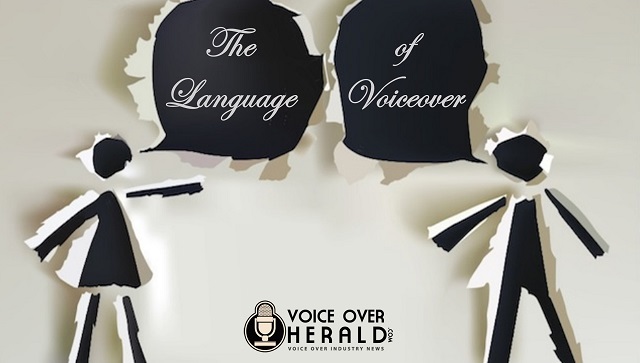The Language of Voice Over
Techniques for creating great voice over reads!
Voiceover scripts are strange beasts.
Often written in language that’s unfamiliar, heavily stylized, rhythmically very different to the way we speak, and wrapped around an advertiser’s message, they present us with a set of problems to solve.
In my book, that’s the fun of voice over, looking at the words on the page and then getting beneath them, to understand how to deliver the message so it connects with whoever hears it.
The more you know about the techniques for approaching any voiceover script you’re handed, and making perfect sense of it all, the more work you’ll book.
The three most important things you need to know about voiceover, are that it’s all about:
- The language,
- The advertiser, and
- The audience
- If you make it all about
If you make it all about your voice, you’ll be in danger of missing the most important reason for the script to exist, the message.
When you’re listening to what’s out there, you’ll hear many different styles of scripts. Knowing how to look at copy, analyse it and understand what the language is asking of you, is something you need to become skilled at.
When you listen to the pros, they make it all sound so easy. But what they’re doing brilliantly is telling the story, placing emphasis just where it’s needed, nailing the message and engaging us with a style they’ve created for that particular script.
So, I want to give you some techniques for deconstructing the kind of script style that’s used over and over again in radio; ‘Announcer style’, which is usually full of information.
Voicing for radio scripts differs from other mediums, like television or corporate voiceover. In radio, it’s just your disembodied voice, delivering the message to a ‘half-listening’ audience, in a way that both satisfies the advertiser and engages the listener.
You need to understand the story of the script, and have found all the words that are ‘about’ that story.
I’ve said this a million times, but a script is never just a bunch of words. It’s a series of thoughts, ideas, key words, key phrases and messages that each have a separate and distinct meanings.
Let’s talk about ‘Announcer’ style.
In this style, you’re most often delivering the message as the spokesperson for the company and often the script will begin with the name of the company, and be closely followed by a possessive pronoun, such as ‘our’. For example:
‘At Novotel, we understand the high cost of raising a family’.
When you look at this style of script, you need to first ask it these questions:
- What’s the name of the company or product and where does it appear?
- What’s the central reason for the ad?
- Who am I talking to? (Choose one specific person).
- What do they need to hear?
- What do I want them to do?
- What are the separate thoughts or ideas?
- Where are the words in the scripts that are about the message?
- The clues are all in the script. But you have to look for them. Here’s the sample script I’ve chosen.
The clues are all in the script. But you have to look for them. Here’s the sample script I’ve chosen.
“At Novotel,/ we understand the high cost of raising a family./
That’s why we give you a great rate/.
We also give you a great room./
One that comes with an in-room coffee maker/ and a 25 inch television with Nintendo for the kids/, as well as 1st run movies for the grown ups./ Not to mention the continental breakfast delivered right to your door./
And we promise/ that if your room isn’t right,/ we’ll make it right/…or you don’t pay/.
Novotel/…more for your money.”/
One of the most important things you need to do is find and separate the different thoughts and ideas. I’ve done that for you, by putting a slash after each.
Really look at how different each statement is.
I’ve also bolded the key ‘message’ words and phrases. This is where you place emphasis. The best way to place emphasis is by slowing down slightly through the word or phrase. Don’t forget to smile!
Read the script now honouring those slashes as pauses. Using short pauses will help the listener hear each different piece of information.
Okay, let’s answer the other questions in that checklist.
The company name, Novotel, appears in the opening line and in the tag line. When you first say the name, it’s really important. The next time you say it, it will often be about added information. In this case, it’s the concept line, ‘more for your money’
The central reason for the ad is that because Novotel, who ‘understands the high cost of raising a family’, is providing added value in its rooms.
Knowing what the language is that states the central reason for the ad, will help you work out who you’re talking to.
In this case, it’s a woman, most likely because research done by the Novotel tells them that it’s women who are booking the rooms.
What they need to hear is that the added value will mean they have a great holiday.
What you want them to do is make a booking.
The specific words in the script that are about this message, I’ve bolded. If you look at them in isolation, you’ll see that those words, and only those words help tell the story of the ad. Knowing this will help you make the right choices of where to place emphasis, and avoid you placing it where it doesn’t belong.
If you use this checklist when you look at a script, it will help you focus on all the elements in the script that are important to both the advertiser and the audience.
In voice over, understanding how to look at the language and the messages in the script ensures you’ll be booked time and time again.
Happy voiceovering!

One of Australia’s most recognized mainstream voice actors, Abbe’s known for her versatility across age ranges from child to adolescent, bright young and bubbly to street smart with attitude, warm and natural to authoritative and commanding.
A voice over coach for over 10 years, and now an International Speaker, her coaching and talks give voice actors clear, easy to implement techniques into scripts of all styles, that translates into more engaged performances. Abbe has also worked on screen and stage and is a proud member of the Equity Section of the Media Entertainment and Arts Alliance (MEAA) in Australia, where she’s a member of the Equity Section Board, ‘The National Performers Committee’, and is currently serving as Victorian Branch President of Equity.
Hear examples of her work at her personal website: http://abbeholmes.com. Visit her coaching website: http://voiceovercoach.com.au

